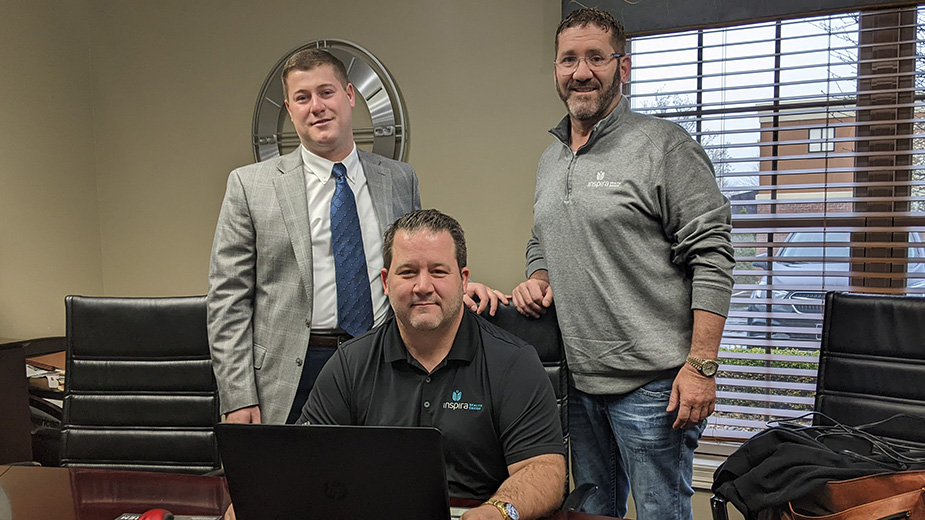Hiring STNAs Challenges Senior Care Providers
YOUNGSTOWN, Ohio – When General Motors closed its Lordstown assembly plant, Lisa Manolio lost her 15-year job at Magna Seating.
“I didn’t know what to get into because that’s all I knew – how to build seats for the Cruze and whatever GM was building at the time,” Manolio says. “I’ve never not had a job.”
Manolio applied for a job as a part-time shower aide at the Inn at Walker Mill, a Briarfield assisted living and memory care center in Boardman. She eventually moved on to full time and took on other duties, such as doing the hiring background checks.
When Briarfield opened its Briarfield Place skilled nursing and rehabilitation center in Boardman, company president Diane Reese offered to pay for Manolio’s training and testing to become a full state-tested nursing assistant and STNA supervisor there. Manolio accepted.
“I worked in the morning from 5, 5:30 a.m. until 8 a.m., [then] went straight to school and was in school until 2 p.m.,” Manolio says. “I feel good when I leave here. I feel like I counted, I made a change.”
Offering to pay for training and testing are among the incentives Mahoning Valley senior care providers offer to recruit applicants. Still, hiring and retaining STNAs remains challenging, they say.
Many providers saw their resident census dip during the last two years. But now vacancies are being filled and providers are working to hire more STNAs.
Windsor House saw the resident census across its 17 locations dip 30% from the pre-pandemic level of some 1,000 residents, says Cindy Cerimele, senior vice president of human resources. Occupancy has since increased steadily to nearly 900.
“So, our STNA needs have grown exponentially,” Cerimele says. “It’s not like anything we’ve seen for a long time. And it’s very competitive.”
Nursing homes compete for employees against other business sectors such as fast food, manufacturing and retail, she says. Windsor House offers a sign-on bonus of $10,000, paid over two years with the first $1,000 paid after the first 30 days.
That’s driven an uptick in candidates since Jan. 31, Cerimele says. In March, Windsor hired 107 people and has 60 open STNA positions.
“We have to find ways to distinguish ourselves,” Cerimele says. “To get folks in the door in today’s market, you’ve got to be able to offer them something more than that hourly rate.”
But while job applicants are increasing for many local senior care centers, a few lingering issues remain.
Temporary Nursing Aides
The most pressing issue is an emergency Temporary Nursing Aide (TNA) waiver implemented by the Ohio Department of Health during the pandemic, which expires June 6. The waiver allowed senior care providers to hire TNAs who completed an online course and on-the-job training in lieu of the required 80 hours of classroom and clinical instruction for taking an STNA test.
Local senior care providers are now working to get those TNAs tested. After the waiver expires, they will have 120 days to pass their STNA test or will need to start training from scratch.
Windsor House has about 80 aides on staff who will need to take their STNA test by that deadline. “A lot of them we’ve already tested,” says Adrianne Carlson, a recruiter with Windsor House. “We didn’t wait.”
To help them prepare, STNA supervisors work alongside them. “We assign them a mentor – someone who they can go to with their questions,” Cerimele says.
There aren’t many training classes for STNAs in the area, says Briarfield’s Reese. “And they’re going to fill up quick because of the number of temporary nursing assistants that everyone employed,” she says.
Tracie Staebler, corporate human resources director at Shepherd of the Valley, says some nursing instructors – who are nurses themselves – left teaching to earn more as agency nurses. That leads to fewer STNA classes, which are required to have a one-to-eight ratio of instructors to students.
Some companies run their own STNA classes or have partnered with local training providers to hold classes at their locations. Shepherd has partnered with ETI Technical College in Niles by opening its Liberty location to host classes, Staebler says.
Inspira Health Group hired a registered nurse to teach classes in-house, says Matt Cilone, HR director. Prospects complete a two-week STNA class rather than the typical six weeks, saving them the cost of taking the class elsewhere. Inspira also pays for their STNA test, he says.
“If you have a class of 10 and you get two to three good aides out of it, I feel it’s a success for us,” says Joe Cilone, Inspira president and owner. “We typically run a class every quarter at each location.”
Maintaining the Pipeline
A few common reasons STNAs might leave the field is they become overwhelmed by the physical demands and long hours. Local providers don’t deny that the job is physically demanding. But they are finding ways to work with their employees to maintain a work/life balance.
“They say it’s too much,” says Briarfield’s Manolio. “It is physical. Because some of these people just came from the hospital and they need care.”
To alleviate some of that workload, Briarfield relies on some STNAs to focus on particular tasks, like showers or dining, as well as other hospitality aides who can accomplish daily tasks, such as answering a patient’s call light or handing them their remote control if it’s out of reach.
“That kind of assistance is a huge help to our nursing assistants,” Reese says.
In addition to recruiting new hires through incentives, Briarfield is working to produce its own STNAs and nurses internally. As Manolio advanced from her original position as a shower aide, Briarfield encourages other aides to grow within the company, Reese says.
Some 85% of Briarfield’s nursing staff started in front-line positions, says Amanda Rivera, corporate HR director. Of its total STNA staff, 30% have been with Briarfield at least five years, and 60% of that group has been with the company for more than a decade, she says.
To retain staff, employers offer incentives, including shift bonuses, 401k with company match and scheduling flexibility within reason.
“If they take advantage of everything, our STNAs would make between $25 and $35 an hour,” says Inspira’s Joe Cilone. That includes the company’s health insurance and 401k, which it matches 4% for 5% put in.
The younger STNAs don’t always take advantage of those, he says, including the 401k. Of the roughly 500 employees there, “We’d be lucky if 100 take advantage of the 401k,” Cilone says. Yet, he’s seen those same employees drawn to competitors paying a dollar or two an hour more.
Shepherd of the Valley’s Limongi says younger workers aren’t as drawn to the financial incentives. Some STNAs coming into the field have an expectation that it’s going to be a Monday to Friday job, he says, which isn’t the case.
“They don’t want to work weekends. They don’t want to work holidays. A lot of them want to work the day shift,” he says. “We have to man our buildings 24/7, three shifts a day. We don’t have that luxury of letting somebody just work Monday through Friday.”
To meet employees halfway, Shepherd allows nurses to pick the days they work the later shifts and will schedule them every other weekend.
“It’s like we’re trying to do a partnership,” Staebler says. “Health care is extremely stressful and we understand they need their time, their mental health breaks as well as time with their loved ones and their families.”
Shepherd also offers incentives for picking up extra shifts, which was critical during the pandemic, she says.
Thus far, Shepherd’s efforts to attract and retain workers have been working well. The company is doing two orientations weekly for new hires, and it hired 92 in the first quarter, which is up from 70 the same time last year. Shepherd operates five locations, including its corporate office.
“It’s a nice uptick. I’m hoping that trend continues,” Staebler says.
Pictured: Inspira Health Group hired a registered nurse to teach STNA classes, says Matt Cilone, HR director. Standing behind him are Joey Cilone, administrator, and Joe Cilone, president and owner. Inspira formerly operated as CHCC Companies.
Copyright 2024 The Business Journal, Youngstown, Ohio.



